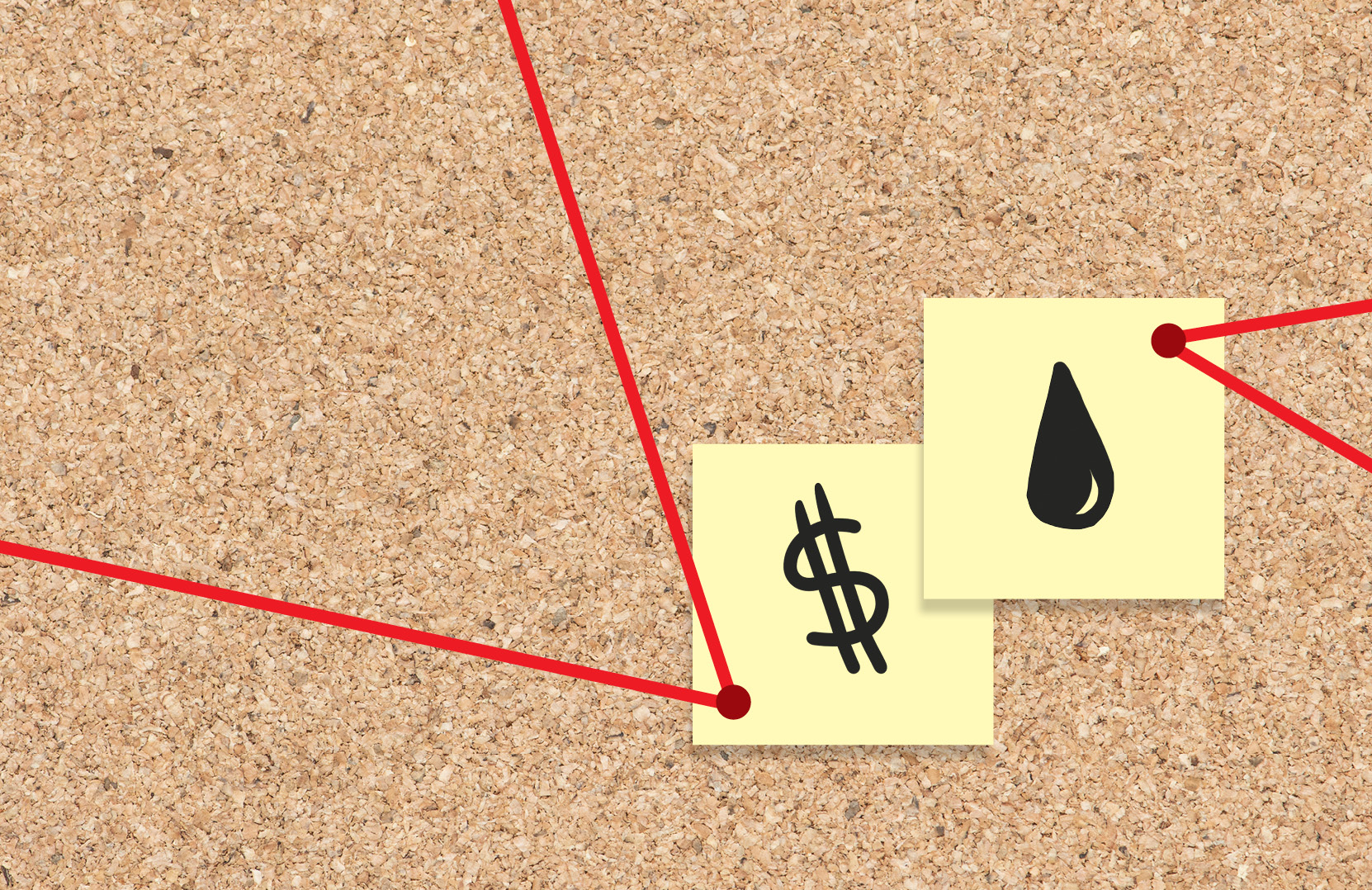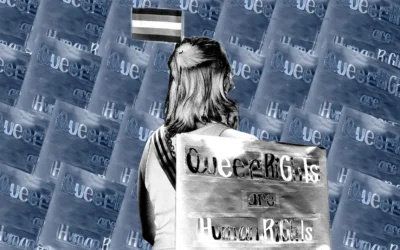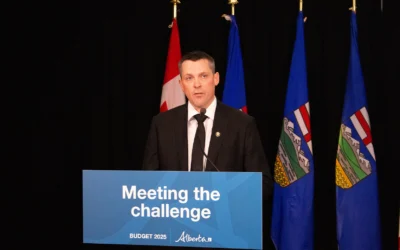The Government of Alberta appears to be engaged in a conspiracy theory to try and discredit climate reporting — one that describes shadowy international groups handing out directions to journalists, as well as activists, non-profits, and governments in a supposed effort to undermine Alberta’s fossil fuel industry.
This theory has been subtly brewing for a while. It first popped up when the United Conservative Party formed its infamous “energy war room” (formally the Canadian Energy Centre) in 2019 as “a direct response to the domestic and foreignfunded campaigns against Canada’s oil and gas industry,” said managing director Tom Olson at the time. The $30-million-a-year project is purported to have a number of functions, but in practice the war room basically just produces op-eds that respond to environmental criticisms of the industry — and start petty Twitter drama for which its staff later has to apologize.
Throughout its lifetime, the war room has been criticized for being a waste of public money, an attack on the press, and an attack on democracy. More importantly for this article, many have pointed out that the idea of foreign-funded campaigns against oil and gas paints a conspirato rial image of environmental advocacy groups — an image that is distorted for a few reasons.
First of all, the provincial government’s particular notion of foreign-funded campaigns is based on dubious research from noted non-climate expert Vivian Krause, who first began writing about them while being paid by a salmon farming company whose practices were heavily criticized by environmental groups like the David Suzuki Foundation, per reporting from The Narwhal. The Narwhal also reports she has since been paid speaking fees from the Canadian Association of Petroleum Producers, the Canadian Energy Pipelines Association, and a number of other oil and gas interest groups as part of her now decades-long career supporting the industry and arguing against concepts like green energy and land conservation.
Secondly, some have pointed out the falsely conspiratorial connotations of “foreign funding” more generally. Former crown prosecutor and current political commentator Sandy Garassino explains it as a common tactic of governments to discredit climate activists and advocacy groups without having to address their concerns, by instead just painting them as shady and nefarious. Journalist James Wilt explains the underlying anti-semitism of such claims, especially as they relate to George Soros, a common target of Canada’s conservatives.
But it wasn’t until Jan. 13, 2021 that the war room rid itself of any plausible deniability over conspiracy criticisms, when the Nemeth Report was released. The Nemeth Report was commissioned by the war room — it’s author was paid $28,000 by the Alberta government, reports Vice — and has the purpose-defining subtitle: “Understanding the Transnational Progressive Movement, the Energy Transition and the Great Transformation Strangling Alberta’s Petroleum Industry.”
The report goes beyond the war room’s usual practice of pointing out that some groups who criticize the tar sands sometimes take money from organizations headquartered outside of Canada. Instead, it describes a global network of funding and information (the “transnational progressive movement”) involving the United Nations, journal ists, and advocates of plant-based diets, among many others, that is coordinating an effort to rid the entire world of fossil fuels. This, the report claims, is not to save the world from climate change, but to “create a new global civilization based on degrowth and renewable energy” (the “great transformation”). Oh, and also, the COVID-19 pandemic is apparently being leveraged to accelerate this transformation. It’s a little bizarre.
Supposedly, this network not only funds environmental journalism, but distributes propa ganda to turn public opinion in their favour. This “propaganda” includes the body of research on the climate emergency — consisting of 97 per cent of the world’s experts concluding that it exists, is driven by human activity, and is partially driven by the emissions created from fossil fuels — and the practice of journalism trade associations and newspapers creating guidelines for reporting on the issue, which include recommended terminology and ways of framing the situation.
If you haven’t been paying very close attention to this issue, at this point you may be wondering: what exactly is the problem here? Maybe the part about creating a new global civilization is a little far-fetched, but environmentalist groups do receive funding from foreign organizations, and journalism associations do coordinate tactics for reporting on the climate crisis.
One of the smaller problems, as Brent Jolly, executive director of the Canadian Association of Journalists (CAJ) explains, is that creating guidelines for journalists is not only a common, known practice, it also tends to improve the quality of reporting.
“There is clearly a demand for environmental journalism, and so if there is a demand, you want to know how to go about doing it the right way, as opposed to making a bunch of mistakes and doing it the wrong way,” he says, which is especially important when a journalist is reporting on a highly technical topic like the environment.
So when the Society for Environmental Journalists creates a “Reporter’s Toolbox” that encourages reporters to use the term “climate crisis” as opposed to “climate change” — an example that was specifically called out in the Nemeth Report — it isn’t propagandizing, it’s determining ways to more accurately describe how important of an issue the science tells us this is, Jolly says.
“Their efforts are to show that this is something that needs to be addressed,” he adds. “‘Climate emergency,’ or ‘climate crisis,’ amplifies it, and hopefully gets people to pay attention.”
The CAJ condemned the Nemeth Report shortly after it came out, for mischaracterizing the work of climate journalists and journalism organizations as conspiratorial. The condemnation mentions the fact that 11,000 scientists approve of the use of “climate emergency” in the news.
“There is overwhelming evidence that this is an issue,” says Jolly. “Journalists reporting on it should not be seen as an act of advocacy — it’s just the truth.”
Which brings us to another small problem with the Nemeth Report, which is actually a big, glaring problem. For its claims to make any sense, the journalists, activists, and the scientists they get their information from would have to be wrong about the climate emergency, right? A coordinated network of information, even if it is trying to get the world to stop using fossil fuels, wouldn’t be an issue if the information is good and important. So, what does the report have to say in response to 97 per cent of the world’s scientists?
Nothing.
That’s right, the report that concludes the climate emergency is a ruse to transform civilization hardly says a word about the climate emergency. The only actual thing the report attempts to refute (on page 24) is the claim that extreme weather events have been occurring more frequently in recent years. No specific example of someone making this claim is given, but here is one for reference, and the report doesn’t so much explain why the author thinks this is false so much as just says it is, and then cites an article from the right wing commentary website founded by Tucker Carlson, the Daily Caller, as proof.
Jolly says that citing the Daily Caller — which a 2018 media study titled “Network Propaganda” concluded routinely fails to be factual in its reporting — is particularly questionable, and points to the larger fact that the report doesn’t give any reason for believing what it does about climate advocates.
“It’s like, where are (they) getting this from? Is there any actual evidence, or is this just an opinion and (they are) scrambling to find somebody who will say something to support it, because inevitably, somebody always will? ” he says.
However, just like what Sandy Garassino said of “foreign funding” claims, this is the entire point of conspiracy theories like those in the Nemeth Report. As Jolly explains, the idea is to push aside any opposing arguments to something, like investing in oil pipelines, which can be especially problematic if the opposition is coming in the form of journalism.
“The government doesn’t want to be held accountable for the possible deleterious impacts of climate change, but it understands the work that journalism can do to hold actors accountable,” he says. “Environmental reporting is not just talking about pine cones or rabbits. It talks about wealth, and power.”
As for the whole “great transformation” side of the report — it appears to be just a slightly repackaged version of the “great reset” conspiracy theory, which has been debunked at length elsewhere, such as by climate journalist and author Naomi Klein, here. The short version of the critique is, conspiracy theorists take comments from interna tional conferences on the climate emergency about the need to “reset” our economies, or something similar, and treats this as a nefarious plot. The Nemeth Report does the same, taking a 2009 conference in Germany titled “The Great Transformation,” which discussed the social and cultural changes necessary to keep us from irreversibly warming the planet, as its main inspiration.
Nobody in the Government of Alberta had much to say about the report, in spite of its widespread criticism. A Canadian Energy Centre spokesperson told the Edmonton Journal that the report was commissioned merely to gather “a range of opinions,” and that it doesn’t necessarily represent the views of the organization, and nobody from the centre responded to the griff’s requests for further comment in time for publication.
But Jolly sees little difference between the theories of the Nemeth Report and what the war room was putting out before, at least regarding the picture it paints of journalists.
“It’s all part and parcel. It’s pushing back on what is accurate, and trying to propose a different narrative,” he says.





0 Comments